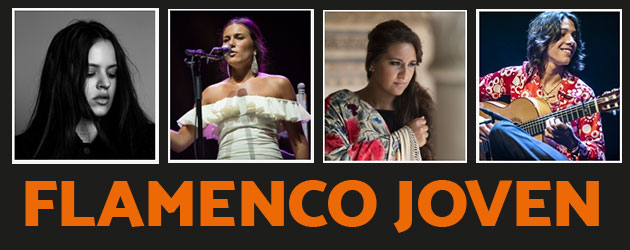Silvia Cruz Lapeña
The Conde Duque Theater offers four days of performances with singing, dancing and guitar-playing, in which artists under 30 demonstrate their talent in Spain's capital.
At what age can an artist be considered fully mature? The question, impossible to answer, is even more complex in the world of flamenco, where it is said that singers should be aged and have experience in order to give their best and sound the way their music, verses and traditions deserve. This is also known by the people responsible for the series Flamenco Joven being celebrated September 20th to 23rd at Madrid’s Conde Duque theater, where they have chosen a group of young people, but with artistic baggage of their own, to show Spain’s capital the shape of flamenco things to come.
“The first requirement is that they be under 30, but they must also be more or less mature artists” says Pablo Sanz, cultural programmer of the venue and the person in charge, along with Antonio Benamargo, of planning this year’s edition, the third of the series.
On the bill for 2017 there are names such as singer Lela Soto, heir to the Sordera family of Jerez; Tomatito hijo on guitar and dancer Nazaret Reyes. They are just a sampling, each day there’ll be a representative of each discipline on the stage of the Madrid theater: “These are performances of two hours where a singer, guitarist and dancer will have their space” says Sanz, who assures us making the choice is never an easy task.
A keen eye
In the venue of Flamenco Joven, administered by the Madrid municipal government, there are two lines of work with which they seek to encourage the talents of young people and women. “It’s a public resource, and as such, owes a debt to society” says Sanz, who tells us the initiative has the full support of town hall.
Sanz, who has been involved in flamenco for years as he used to study at the San Juan Evangelista school, called upon Benamargo as soon as he began to work for the Conde Duque because he’d already programmed a similar series in 2008. “And also because he’s one of the best programmers in Spain, he has exquisite taste and vast knowledge of flamenco newcomers” says the person in charge of the theater.
Looking over the program, you have to admit that Benamargo has a keen eye. So much so, that when the contracts were signed for this series, only he could imagine that some of his “recruits” were about to have a very busy summer. Such is the case for example of two young people who this year made it to the Festival de Cante de las Minas. “Alejandro Hurtado for example, who won the Bordón Minero in La Unión, and Macarena Ramírez who came in second for the dance prize, El Desplante” explains Sanz.
Classic flamenco
The kind of flamenco the festival wishes to promote is “por derecho”, classic flamenco, and with that declaration of intent, it becomes necessary to ask the person in charge to explain the presence of Rosalía on the bill. The Catalonian singer has just returned from her triumph with Refree and her recording Los Ángeles, which enjoyed a great deal of success and media attention, while being a far cry from the classic flamenco the organization aims to defend. “That’s true, but here Rosalía is going to interpret classic flamenco, and it will be a privileged opportunity to see her in a register that will be accompanied on guitar by Joselito Acedo” says the programmer of the Conde Duque who feels “flamenco fusion already has its own circuit”.
Dancers David Martín and Cristobal Reyes; singers Israel Fernández and Celia Romero and the guitars of Álvaro Mora and the Mexican woman Andrea Salcedo are other performers who will be seen in an event in which all participants are being paid. “This is important, because Flamenco Joven isn’t a contest or a showcase, it’s a way of giving a platform to artists who don’t yet have big names, but a big talent” says Sanz for whom it is important to promote an art-form that “has not always been treated well”.
